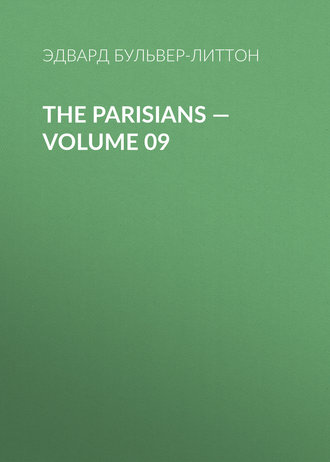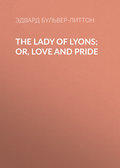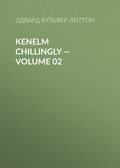
Эдвард Бульвер-Литтон
The Parisians — Volume 09
CHAPTER IV
There is somewhere in Lord Lytton's writings—writings so numerous that I may be pardoned if I cannot remember where-a critical definition of the difference between dramatic and narrative art of story, instanced by that marvellous passage in the loftiest of Sir Walter Scott's works, in which all the anguish of Ravenswood on the night before he has to meet Lucy's brother in mortal combat is conveyed without the spoken words required in tragedy. It is only to be conjectured by the tramp of his heavy boots to and fro all the night long in his solitary chamber, heard below by the faithful Caleb. The drama could not have allowed that treatment; the drama must have put into words, as "soliloquy," agonies which the non- dramatic narrator knows that no soliloquy can describe. Humbly do I imitate, then, the great master of narrative in declining to put into words the conflict between love and reason that tortured the heart of Graham Vane when, dropping noiselessly the letter I have just transcribed, he covered his face with his hands and remained—I know not how long—in the same position, his head bowed, not a sound escaping from his lips.
He did not stir from his rooms that day; and had there been a Caleb's faithful ear to listen, his tread, too, might have been heard all that sleepless night passing to and fro, but pausing oft, along his solitary floors.
Possibly love would have borne down all opposing seasonings, doubts, and prejudices, but for incidents that occurred the following evening. On that evening Graham dined en famille with his cousins the Altons. After dinner, the Duke produced the design for a cenotaph inscribed to the memory of his aunt, Lady Janet King, which he proposed to place in the family chapel at Alton.
"I know," said the Duke, kindly, "you would wish the old house from which she sprang to preserve some such record of her who loved you as her son; and even putting you out of the question, it gratifies me to attest the claim of our family to a daughter who continues to be famous for her goodness, and made the goodness so lovable that envy forgave it for being famous. It was a pang to me when poor Richard King decided on placing her tomb among strangers; but in conceding his rights as to her resting- place, I retain mine to her name,—Nostris liberis virtutis exemplar."
Graham wrung his cousin's hand-he could not speak, choked by suppressed tears.
The Duchess, who loved and honoured Lady Janet almost as much as did her husband, fairly sobbed aloud. She had, indeed, reason for grateful memories of the deceased: there had been some obstacles to her marriage with the man who had won her heart, arising from political differences and family feuds between their parents, which the gentle meditation of Lady Janet had smoothed away. And never did union founded on mutual and ardent love more belie the assertions of the great Bichat (esteemed by Dr. Buckle the finest intellect which practical philosophy has exhibited since Aristotle), that "Love is a sort of fever which does not last beyond two years," than that between those eccentric specimens of a class denounced as frivolous and artless by philosophers, English and French, who have certainly never heard of Bichat.
When the emotion the Duke had exhibited was calmed down, his wife pushed towards Graham a sheet of paper, inscribed with the epitaph composed by his hand. "Is it not beautiful," she said, falteringly—"not a word too much or too little?"
Graham read the inscription slowly, and with very dimmed eyes. It deserved the praise bestowed on it; for the Duke, though a shy and awkward speaker, was an incisive and graceful writer.
Yet, in his innermost self, Graham shivered when he read that epitaph, it expressed so emphatically the reverential nature of the love which Lady Janet had inspired—the genial influences which the holiness of a character so active in doing good had diffused around it. It brought vividly before Graham that image of perfect spotless womanhood. And a voice within him asked, "Would that cenotaph be placed amid the monuments of an illustrious lineage if the secret known to thee could transpire? What though the lost one were really as unsullied by sin as the world deems, would the name now treasured as an heirloom not be a memory of gall and a sound of shame?"
He remained so silent after putting down the inscription, that the Duke said modestly: "My dear Graham, I see that you do not like what I have written. Your pen is much more practised than mine. If I did not ask you to compose the epitaph, it was because I thought it would please you more in coming, as a spontaneous tribute due to her, from the representative of her family. But will you correct my sketch, or give me another according to your own ideas?"
"I see not a word to alter," said Graham; "forgive me if my silence wronged my emotion; the truest eloquence is that which holds us too mute for applause."
"I knew you would like it. Leopold is always so disposed to underrate himself," said the duchess, whose hand was resting fondly on her husband's shoulder. "Epitaphs are so difficult to write-especially epitaphs on women of whom in life the least said the better. Janet was the only woman I ever knew whom one could praise in safety."
"Well expressed," said the Duke, smiling: "and I wish you would make that safety clear to some lady friends of yours, to whom it might serve as a lesson. Proof against every breath of scandal herself, Janet King never uttered and never encouraged one ill-natured word against another. But I am afraid, my dear fellow, that I must leave you to a tete-a-tete with Eleanor. You know that I must be at the House this evening—I only paired till half-past nine."
"I will walk down to the House with you, if you are going on foot."
"No," said the Duchess; "you must resign yourself to me for at least half an hour. I was looking over your aunt's letters to-day, and I found one which I wish to show you; it is all about yourself, and written within the last few months of her life." Here she put her arm into Graham's, and led him into her own private drawing-room, which, though others might call it a boudoir, she dignified by the name of her study. The Duke remained for some minutes thoughtfully leaning his arm on the mantelpiece. It was no unimportant debate in the Lords that night, and on a subject in which he took great interest, and the details of which he had thoroughly mastered. He had been requested to speak, if only a few words, for his high character and his reputation for good sense gave weight to the mere utterance of his opinion. But though no one had more moral courage in action, the Duke had a terror at the very thought of addressing an audience, which made him despise himself.
"Ah!" he muttered, "if Graham Vane were but in Parliament, I could trust him to say exactly what I would rather be swallowed up by an earthquake than stand up and say for myself. But now he has got money he seems to think of nothing but saving it."
CHAPTER V
The letter from Lady Janet, which the Duchess took from the desk and placed in Graham's hand, was in strange coincidence with the subject that for the last twenty-four hours had absorbed his thoughts and tortured his heart. Speaking of him in terms of affectionate eulogy, the writer proceeded to confide her earnest wish that be should not longer delay that change in life which, concentrating so much that is vague in the desires and aspirations of man, leaves his heart and his mind, made serene by the contentment of home, free for the steadfast consolidation of their warmth and their light upon the ennobling duties that unite the individual to his race.
"There is no one," wrote Lady Janet, "whose character and career a felicitous choice in marriage can have greater influence over than this dear adopted son of mine. I do not fear that in any case he will be liable to the errors of his brilliant father. His early reverse of fortune here seems to me one of those blessings which Heaven conceals in the form of affliction. For in youth, the genial freshness of his gay animal spirits, a native generosity mingled with desire of display and thirst for applause, made me somewhat alarmed for his future. But, though he still retains these attributes of character, they are no longer predominant; they are modified and chastened. He has learned prudence. But what I now fear most for him is that which he does not show in the world, which neither Leopold nor you seem to detect,—it is an exceeding sensitiveness of pride. I know not how else to describe it. It is so interwoven with the highest qualities, that I sometimes dread injury to them could it be torn away from the faultier ones which it supports.
"It is interwoven with that lofty independence of spirit which has made him refuse openings the most alluring to his ambition; it communicates a touching grandeur to his self-denying thrift; it makes him so tenacious of his word once given, so cautious before he gives it. Public life to him is essential; without it he would be incomplete; and yet I sigh to think that whatever success he may achieve in it will be attended with proportionate pain. Calumny goes side by side with fame, and courting fame as a man, he is as thin-skinned to calumny as a woman.
"The wife for Graham should have qualities, not taken individually, uncommon in English wives, but in combination somewhat rare.
"She must have mind enough to appreciate his—not to clash with it. She must be fitted with sympathies to be his dearest companion, his confidante in the hopes and fears which the slightest want of sympathy would make him keep ever afterwards pent within his breast. In herself worthy of distinction, she must merge all distinction in his. You have met in the world men who, marrying professed beauties, or professed literary geniuses, are spoken of as the husband of the beautiful Mrs. A———, or of the clever Mrs. B———-: can you fancy Graham Vane in the reflected light of one of those husbands? I trembled last year when I thought he was attracted by a face which the artists raved about, and again by a tongue which dropped bons mots that went the round of the club. I was relieved, when, sounding him, he said, laughingly, 'No, dear aunt, I should be one sore from head to foot if I married a wife that was talked about for anything but goodness.'
"No,—Graham Vane will have pains sharp enough if he live to be talked about himself. But that tenderest half of himself, the bearer of the name he would make, and for the dignity of which he alone would be responsible,—if that were the town talk, he would curse the hour he gave any one the right to take on herself his man's burden of calumny and fame. I know not which I should pity the most, Graham Vane or his wife.
"Do you understand me, dearest Eleanor? No doubt you do so far, that you comprehend that the women whom men most admire are not the women we, as women ourselves, would wish our sons or brothers to marry. But perhaps you do not comprehend my cause of fear, which is this—for in such matters men do not see as we women do—Graham abhors, in the girls of our time, frivolity and insipidity. Very rightly, you will say. True, but then he is too likely to be allured by contrasts. I have seen him attracted by the very girls we recoil from more than we do from those we allow to be frivolous and insipid. I accused him of admiration for a certain young lady whom you call 'odious,' and whom the slang that has come into vogue calls 'fast;' and I was not satisfied with his answer, 'Certainly I admire her; she is not a doll—she has ideas.' I would rather of the two see Graham married to what men call a doll, than to a girl with ideas which are distasteful to women."
Lady Janet then went on to question the Duchess about a Miss Asterisk, with whom this tale will have nothing to do, but who, from the little which Lady Janet had seen of her, might possess all the requisites that fastidious correspondent would exact for the wife of her adopted son.
This Miss Asterisk had been introduced into the London world by the Duchess. The Duchess had replied to Lady Janet, that if earth could be ransacked, a more suitable wife for Graham Vane than Miss Asterisk could not be found; she was well born—an heiress; the estates she inherited were in the county of—(viz., the county in which the ancestors of D'Altons and Vanes had for centuries established their whereabout). Miss Asterisk was pretty enough to please any man's eye, but not with the beauty of which artists rave; well informed enough to be companion to a well-informed man, but certainly not witty enough to supply bons mots to the clubs. Miss Asterisk was one of those women of whom a husband might be proud, yet with whom a husband would feel safe from being talked about.
And in submitting the letter we have read to Graham's eye, the Duchess had the cause of Miss Asterisk pointedly in view. Miss Asterisk had confided to her friend, that, of all men she had seen, Mr. Graham Vane was the one she would feel the least inclined to refuse.
So when Graham Vane returned the letter to the Duchess, simply saying, "How well my dear aunt divined what is weakest in me!" the Duchess replied quickly, "Miss Asterisk dines here to-morrow; pray come; you would like her if you knew more of her."
"To-morrow I am engaged—an American friend of mine dines with me; but 'tis no matter, for I shall never feel more for Miss Asterisk than I feel for Mont Blanc."







